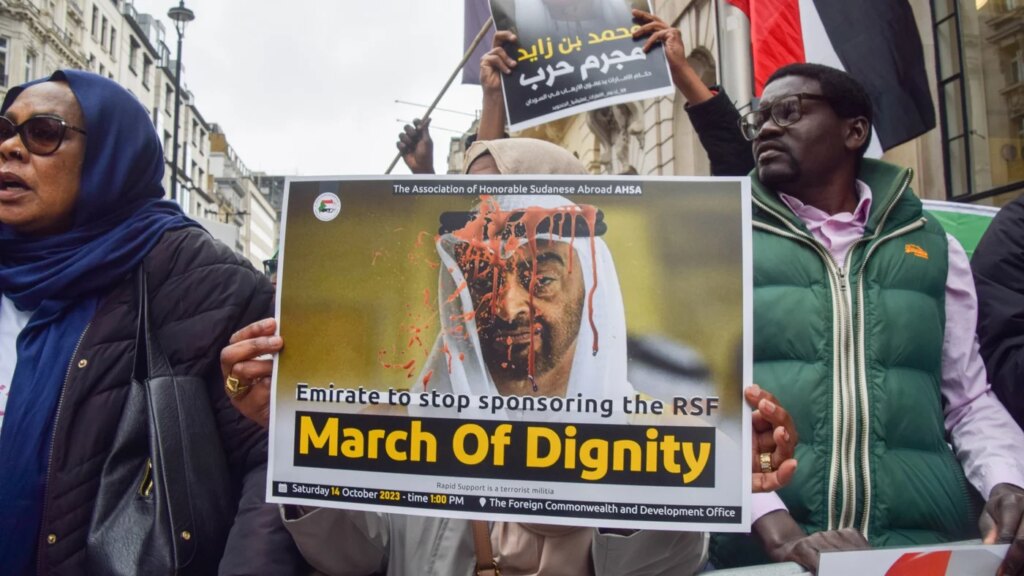Calls to boycott the United Arab Emirates and Emirati-linked companies are growing across social media, fuelled by anger over the Gulf state’s backing of the paramilitary Rapid Support Forces (RSF) in Sudan’s devastating war.
The campaign – which had been circulating in Sudanese and diaspora circles for years – gained fresh momentum after the RSF seized the city of el-Fasher in North Darfur on 26 October.
The capture of the last Sudanese Armed Forces (SAF) stronghold in the region was accompanied by widespread massacres, with harrowing footage showing RSF fighters boasting about killing civilians, including women, children and the elderly, as residents fled the city.
Satellite imagery also showed blood-stained streets and widespread destruction – scenes that have fuelled outrage online.
It is widely documented that Abu Dhabi is the RSF’s main patron, supplying the paramilitary with weapons and materiel.
New MEE newsletter: Jerusalem Dispatch
Sign up to get the latest insights and analysis on
Israel-Palestine, alongside Turkey Unpacked and other MEE newsletters
In response, some social media users are petitioning for Washington, one of Abu Dhabi’s main weapons suppliers, to impose an arms embargo on the country and sanction the RSF and its leadership.
Social media users have also been calling for people to cancel trips to Dubai, avoid Emirati products, and rethink business with UAE-based companies.
“Stop going to Dubai and Abu Dhabi, boycott the UAE for their crimes in Sudan,” wrote one user.
“It is truly not that hard to just book your holiday elsewhere there are much nicer places.”
The movement has included the circulation of infographics listing major Emirati brands like Etihad Airways – as well as international companies perceived to have links with the UAE – under the slogan “Boycott for Sudan”.
When the airline Emirates posted a promotional message on X reading: “This is how we do Business ☁️😇,” users flooded the replies with criticism.
One user replied: “This Is Also How You Do Business,” alongside a video of an RSF fighter killing unarmed men.
Another commented: “All of the comments are people ripping apart the UAE for their genocidal actions in Sudan,” adding that “the UAE overplayed their hand. Now even the regular people who are uninterested in politics have a strong hatred for that country. This issue isn’t going away – the UAE destroyed their brand.”
Some users are also targeting gold exports from the country, which is one of the world’s top exporters of the precious metal.
Much of it is believed to be smuggled from mines controlled by the RSF.
Some reactions framed the boycott in a broader regional context, comparing the UAE’s backing of the RSF, and the group’s atrocities in Sudan to Israel’s genocide in Gaza.
One widely shared post read: “Cancel your trips to Dubai, this year, next year and forever,” adding that “if you have true solidarity for Palestine, you will understand that the UAE is parallel to Israel in this comparison, funding terrorist militias in Sudan for years in exchange for Sudan’s gold. Boycott UAE.”
Palestinian journalist Hind Khoudary, currently based in Gaza, stated that she had planned to visit her father’s grave in the UAE after the war but had chosen to boycott the country, urging others to do the same.
I was planning to visit my father’s grave in UAE post genocide .. but after everything happening in Sudan .. I choose to boycott the UAE ..
Everyone needs to boycott the UAE and Israel
— Hind Khoudary (@Hind_Gaza) October 30, 2025
The war in Sudan erupted in April 2023, when long-simmering tensions between the SAF, led by General Abdel Fattah al-Burhan, and the RSF, commanded by Mohamed Hamdan Dagalo, known as Hemedti, spiralled into open conflict.
The violence was triggered by disagreements over plans to integrate the RSF into the regular army, but quickly evolved into a nationwide war that has killed tens of thousands of people and displaced more than 13 million.
RSF fighters have been accused of massacres and abuses, including a genocide elsewhere in Darfur.
Though the UAE denies that it supports the RSF, its material backing for the group has been well documented.
MEE reported in January 2024 that the UAE was supplying the RSF with weapons through a complex network of supply lines and alliances stretching across Libya, Chad, Uganda and breakaway regions of Somalia.


